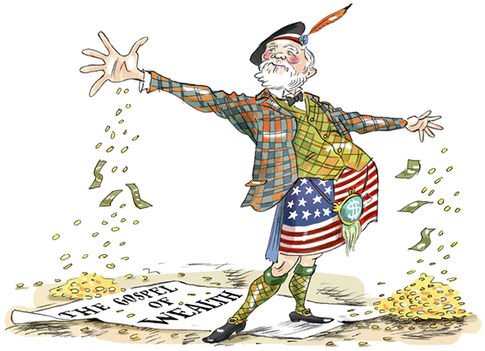Rip Andrew Carnegie…He Would Have Loved This Game
The most common perspective in reading the narrative of Stardew Valley is that it promotes an anti-establishment message that discourages monopolization from big businesses. From the opening sequence of quitting a soul crushing nine-to-five job to the game mechanic of all villagers—excluding that neoliberalist Sam—hating JojaMart gifts, the game reinforces this anti-cooperation motif both in its narrative and mechanics; thus, most players come away from the game feeling triumphant within their accomplishment to thwart the terrible JojaMart cooperation. The player acts as the main catalyst for all these changes that happen within the community of Pelican Town as he is the sole donor and benefactor to the town’s community center, library, and community housing (more on this later). However, this ideology of charitable giving by a sole provider does not necessarily align with the game’s message of demonopolization. For the player—whose wealth, property, and resources far exceed any of the townsfolk—perpetuates a notion of community building that is most similar to that of Andrew Carnegie’s ideology presented within his essay The Gospel of Wealth.
In order to understand the parallels that can be made between Carnegie’s ideal perfect tycoon and the player in Stardew Valley, one must first understand the ideological values and critiques of Carnegie’s piece. Andrew Carnegie was a nineteenth century American industrialist and philanthropist who was admired for his charitable giving, yet condemned for his anti-union policies that led to abysmal working conditions under his steel empire(1). This context is important to his writing for the way he wished to win public favor was by promoting this idea within The Gospel of Wealth that the wealthy elite should be spared from heavy taxation and regulation as they are the ones best fit to aid in the advancement of society. Encompassing his central desire in the essay, Carnegie writes that “individualism will continue, but the millionaire will be but a trustee for the poor; intrusted for a season with a great part of the increased wealth of the community, but administering it for the community far better than it could or would have done for itself”(2). With a foundation in Carnegie’s economic philosophy, we can now see the manifestation of them in Stardew Valley through the player’s wealth and community control.
Carnegie’s Theory in Application to Stardew Valley
In Stardew Valley, the player is incentivized to give gifts both to the townsfolk and community center in order to receive benefits that help to grow their farm and resource production. This is a form of philanthropic giving that believes in the strength of the relationship between the benefactor and benefactee as the benefactor has been entrusted with the role of aiding the people who cannot do so themselves. This is why five of the seven community center completion gifts come in forms that benefit the greater community of Pelican Town; the bus, minecarts, and bridge repair, the glittering rock removed, and the movie theater can all be argued as helping with the advancement of the town for everyone. The player is also the only one who can donate rare artifacts and gems to the museum that aids the cultural development of the community; something Andrew Carnegie was most famous for doing in his lifetime through his various donations in the construction of museums, universities, and concert halls. The player even has the option after the 1.3 patch of the game to purchase the “Community Upgrade” from Robin for 500,000g that promotes Pam and Penny’s trailer to a full house. It is evident within all these examples that the wealthy tycoon who is the player is the sole trustee for this community and is tasked with the advancement of Pelican Town and its citizens. Carnegie’s ideology flourishes within this seemingly utopian community as the player is never taxed on his sales or property(which just so happens to be nearly the size of one-third of the whole Pelican Town)(3). The game never lets the townsfolk contribute to their own advancement in anyways; Carnegie’s perspective of individualism falls upon the player in order for them to have a more controlled and accomplished experience within the game.

Pam’s gratitude for the player’s construction of her new house.
Conclusion and Critiques of this Economic Theory
If Andrew Carnegie was around today, Stardew Valley could be used as the perfect abstract educational tool for him to teach the working class communities how the fundamentals of his theories could be applied. Everything within the narrative and mechanical incentivization of the game promotes this glowing reality in which the player can make a positive philanthropic impact in the NPCs lives; however, the medium of games disallows Stardew Valley the opportunity to promote any one theory of economic or social ideology. For while this game may guide players to this idealized world of Carnegie’s imagination, the freedom to hoard one’s wealth and not contribute to the betterment of the villagers specifically brings to light the greatest critiques of The Gospel of Wealth. For the system, while great in theory, often falls apart at the expense of free will in which Pelican Town has no power over their own prosperity for they have left it all in the hands of a sole farmer. Thus, it is the player who gets to decide whether Carnegie’s ideology of philanthropy gets to be fully realized. Games act as both the greatest promoters and critics of these critical theories for they are not static media that have one fixed narration and mechanics. They are tools within which we can stretch ideologies to their highest and lowest points which often yields a greater understanding of their true strength and weaknesses.
Citations:
(1) Britannica, The Editors of Encyclopaedia. “Andrew Carnegie”. Encyclopedia Britannica, 21 Nov. 2021, https://www.britannica.com/biography/Andrew-Carnegie. Accessed 28 January 2022.
(2) Carnegie, Andrew, 1835-1919. The Gospel of Wealth, and Other Timely Essays. Garden City, N. Y. :Doubleday, Doran & company, inc., 1933.
(3) Stardew Valley Wiki. https://stardewvalleywiki.com/Pelican_Town#cite_ref-forage_spawn_2-0
